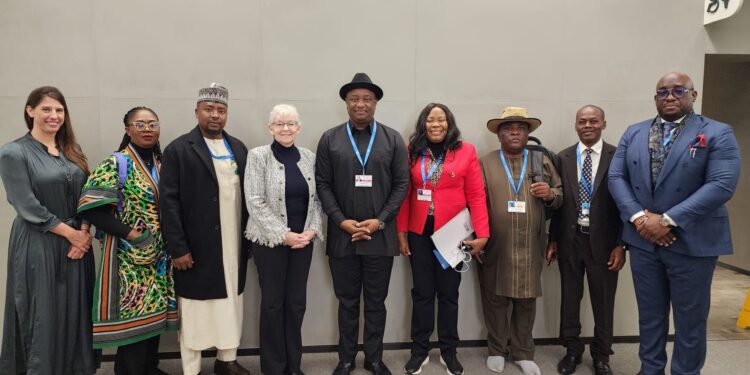Nigeria has secured the commitment of the World Meteorological Organization (WMO) for expanded technical support to strengthen its climate and meteorological capacity.
The announcement was made by Nigeria’s Minister of Aviation and Aerospace Development, Festus Keyamo, via his official X (formerly Twitter) account on Tuesday.
The agreement was reached during a meeting between the minister and the WMO’s Deputy Secretary General, Ms. K.O Barrett, at the 2024 United Nations Climate Change Conference (COP 29) in Baku, Azerbaijan.
Keyamo revealed that the WMO pledged to provide technical assistance to Nigeria as one of its Peer Advisors.
“Yesterday, at the 2024 United Nations Climate Change Conference holding in BAKU, Azerbaijan, (otherwise known as COP 29), I participated in a number of sessions/meetings/activities,” a portion of the tweet read.
It added, “I had a fruitful session with the Deputy Secretary General of the World Meteorological Organisation, Ms. K.O Barrett, and her team where we secured a commitment from the world body for more technical assistance to Nigeria as one of its Peer Advisors.”
This support aims to strengthen Nigeria’s capacity to tackle climate-related challenges by improving its meteorological services and leveraging advanced technical expertise.
What you should know
The World Meteorological Organization (WMO), a specialized agency of the United Nations, is dedicated to fostering international cooperation in meteorology, climatology, hydrology, and related disciplines.
Since its establishment in 1950, the WMO has played a pivotal role in tackling global climate challenges by providing critical data, technical expertise, and capacity-building support to its member states.
- Nigeria’s designation as one of the WMO’s Peer Advisors marks a significant milestone in the country’s active participation in global climate initiatives.
- Peer Advisors are member states or institutions acknowledged for their ability to guide and support others in strengthening meteorological and climate-related capacities. Through this partnership, the WMO promotes the exchange of knowledge, resources, and expertise across its global network.
- The commitment secured by the WMO positions Nigeria to benefit from expanded technical assistance. This support encompasses access to advanced tools, specialized training for local meteorologists, and improved capabilities to monitor, predict, and mitigate climate and weather-related risks. Such advancements are crucial for bolstering Nigeria’s efforts to manage its climate resources effectively and protect vulnerable communities from the impacts of extreme weather events.
Additionally, these improvements in meteorological services are poised to enhance aviation operations in Nigeria. Better weather monitoring and forecasting can increase flight safety, optimize flight planning, and support efficient airport operations, further strengthening the country’s position as a regional aviation hub.








